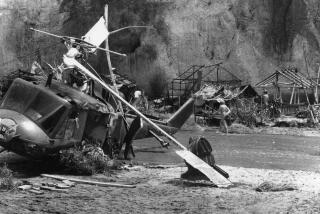In Spotlight or Out, Noguchi Has Endured
- Share via
For the first half of his career, Thomas Noguchi, the flamboyant self-styled “coroner to the stars,” rode to fame on the toe tags of Hollywood’s rich and tragic.
For the second half, he kept his public profile so low it circled the drain.
Noguchi’s has been a remarkable, 38-year career spanning a remarkable period of Los Angeles history. He pioneered the psychological autopsy, wrote a bestseller and dissected the corpses of a who’s who of the dearly departed: Marilyn Monroe, Robert F. Kennedy, Sharon Tate, Janis Joplin, Natalie Wood, William Holden and John Belushi, to name a few.
Those rumors of Noguchi’s professional death 17 years ago were premature. Exiled to County-USC Medical Center when his bosses on the Board of Supervisors stripped him of his job as coroner, he refused to be chased away.
From his basement office, with its “Welcome to Siberia” sign on the door, he took his career in a different direction. Although he continued to walk among the dead, his focus shifted to teaching and research.
Until Jan. 1, when he retired after 38 years with the county, Noguchi was performing autopsies as an $11,500-a-month physician-specialist for the Department of Health Services.
In recognition of his long career, colleagues in the coroner’s office and the medical community are throwing him a dinner tonight. About 300 well-wishers are expected to attend.
But Noguchi isn’t leaving the medical life behind altogether. He plans to continue teaching USC Medical School students how to unravel the mysteries of death. And he intends to continue performing at least one autopsy a week.
At 72, he still can make a body talk. An autopsy, he is fond of saying, is a homicide victim’s opportunity to testify.
“The victim is talking to you,” he says.
And now, after nearly two decades of silence, Noguchi is talking again too.
“I have nothing but words of appreciation,” he said in an interview Thursday. “I have enjoyed every one of my 38 years with the county.”
Even when he was under sharp criticism? “I had my share of praises also, but people don’t remember that,” he said.
Noguchi’s focus these days is not so much on death, but on the key to long life.
He said he believes that he has found the secret: no dieting.
“People who go on diets die early,” he said. But by eating moderately and staying active, he plans to live past 100.
And he is alarmed that 20% of the bodies autopsied show signs of diseases that, although undiagnosed, had advanced to alarming stages.
The man who told the world that Holden and Wood were drunk when they died, that Monroe was depressed and took her own life by downing 50 sleeping pills, and that Joplin and Belushi succumbed to accidental drug overdoses, says he never has regretted talking, even when it would have been safer to remain silent.
His public disclosures about Wood’s and Holden’s deaths prompted the Screen Actors Guild to write a formal letter of protest to the county supervisors. Frank Sinatra, who was friendly with Wood, also wrote the board to complain, according to Noguchi’s friend and longtime lawyer, Godfrey Isaac.
But Noguchi said he had a message to deliver: Holden and Wood would not have died if they hadn’t been drinking. And, when he weighed their individual privacy rights against the need to educate the public, privacy took a back seat.
“There’s always a backlash,” Noguchi said. “We’re dealing with the basic, fundamental right of privacy and the public’s right to know. These issues are not always compatible, but I don’t want to be part of the cover-up,” he said.
A Magnet for Controversy
Noguchi’s charisma, outspokenness and love of the spotlight always made him a magnet for controversy. Twice, in 1969 and 1982, the supervisors fired him. Both times he fought back, regaining his job the first time and losing it the second time, even though he battled the board for five years--all the way to the state Supreme Court.
Isaac, Noguchi’s attorney as well as his unofficial Boswell, defended him both times. He considers Noguchi to be brilliant and calls him a Renaissance man who is expert on many subjects, even the causes of scuba-diving deaths.
In 1969, Isaac recalled, “they charged him with 62 counts of wrongdoing. Some were nonsensical. They said he smiled at disasters, that he threatened to kill Mayor [Sam] Yorty, that he botched Robert Kennedy’s autopsy.”
A county report even suggested that Noguchi needed psychiatric care.
Isaac believes that prejudice lay behind the campaign to discredit the coroner, who after all was born, raised and trained in Japan.
“I recognized in him that he came from a different culture,” Isaac said. “I came to realize they were portraying him like a kamikaze pilot. The Japanese were not beloved at that time.”
The 1969 board hearings were televised and lasted six weeks. In the end, after more than a million words of testimony, none of the allegations were substantiated and Noguchi was reinstated.
A dozen years later, he found himself under fire again.
This time, he was accused of mismanagement, using the office to promote his personal projects and, of course, sensationalizing the deaths of Holden and Wood. He was asked to step down. He refused.
Redubbed “the fighting coroner,” Noguchi remained popular with the public. Supporters rallied behind him with “Support Your Local Coroner” T-shirts and bumper stickers.
Although he was reinstated by a Civil Service hearing officer, the full commission demoted him. He appealed, and the county’s action was upheld in the state Court of Appeal.
The court, however, took pains not to criticize Noguchi too harshly.
“This does not denigrate the reputation of Dr. Noguchi, an outstanding pathologist and forensic scientist, but it does indicate that he lacks the managerial skills and administrative ability to run the coroner’s office,” the court said.
The state Supreme Court refused to hear the case.
If anything, the controversy was good for book sales as Noguchi’s autobiographical tome, “Coroner,” hit the stores. The book dished the dirt on several of the more prominent subjects of Noguchi’s autopsy table, and he autographed copies by scrawling what now seems a fitting sign-off: “Forensically yours.”
More to Read
Sign up for Essential California
The most important California stories and recommendations in your inbox every morning.
You may occasionally receive promotional content from the Los Angeles Times.










